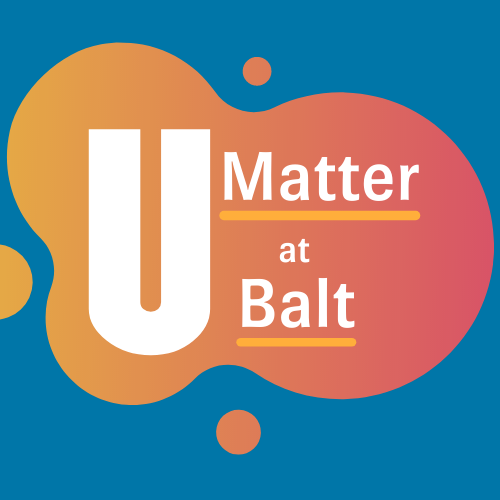UMatter @ UBalt

UMatter is an active bystander intervention program at the University of Baltimore (UBalt) that supports a culture where people care and help each other. UMatter provides UBalt students, staff, and faculty with the skills neccesary to safely identify and help individuals in need.
Through participation in the UMatter program, participants can grow both personally and professionally as they learn healthy communication and intervention skills. The Office of Student Support holds events during I Will Listen Week in the fall semester and during UMatter Week in the spring semester.
If someone is in immediate need of help, you can call 911 for the University of Maryland, Baltimore Police Department or local emergency personnel.
What is a Bystander?
Active Bystanders:
- Make healthy choices
- Care for others and themselves
- Considers all their options
- Takes actions
- Recognizing the situation – you must be aware of the problem and recognize the negative impact on the victim to be able to intervene
- Being Asked – those who are asked and agree to help are far more likely than those who are not asked.
- Role Model – having role models who help and witnessing others intervene in situations can facilitate intervention
- Sense of Personal Responsibility – influenced by victim empathy and norms about helping. A person who feels a sense of personal responsibility is more likely to form an intention to intervene and decide specifically what action to take.
- Group Size – The number of bystanders thought to be present may lead someone to be quicker or slower to act.
Stages of UMatter Bystander Intervention
Some situations may be easily noticeable, but other high-risk behaviors could potentially escalate to dangerous situations, including: offensive comments, atypical or withdrawn behavior, controlling behavior in a relationship, or high-risk drinking and/or drug use.
When it is appropriate to intervene, the intervention should match the level of severity of the situation. The goal is always to de-escalate the situation.
Even if it seems like it is “not your business” or someone else should intervene, you may need to help to make that happen.
Remember the Three D’s:
- Distract – Create a distraction or redirect a person’s attention
- Direct – Confront the harmful behavior directly
- Delegate – Seek assistance from others
There are multiple options when it comes to intervening; learning an array of direct and indirect approaches allows you to choose the one that best fits the situation.
Notice how the situation and your intervention may have affected you emotionally, mentally, and physically. Create a self-care plan that helps you de-stress following your intervention, and consider consulting a mentor or expert in this area as you develop intervention skills.
Adapted from the UMatter program at Princeton University (https://umatter.princeton.edu/)

